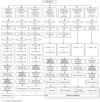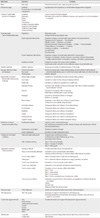Abstract
Purpose
The purpose of this project was to develop an international web-based expert system using principals of artificial intelligence and user-centered design for management of mental health by Korean emigrants. Using this system, anyone can access the system via computer access to the web.
Methods
Our design process utilized principles of user-centered design with 4 phases: needs assessment, analysis, design/development/testing, and application release. A survey was done with 3,235 Korean emigrants. Focus group interviews were also conducted. Survey and analysis results guided the design of the web-based expert system.
Results
With this system, anyone can check their mental health status by themselves using a personal computer. The system analyzes facts based on answers to automated questions, and suggests solutions accordingly. A history tracking mechanism enables monitoring and future analysis. In addition, this system will include intervention programs to promote mental health status.
Figures and Tables
References
1. Bae JY. Development of a user centered web site for mental health management in adolescents. J Korean Acad Nurs. 2007. 37(1):14–25.
2. Bae JY, Kim YH, Hwang WJ, Panuncio RL. Development of an expert system for prevention and management of substance related disorder in adolescents. J Korean Acad Psychiatr Ment Health Nurs. 2009. 18(2):116–128.
3. Bae JY, Kim YJ. Immigrants health-related web site content analysis. Int J Comput Sci Netw Secur. 2009. 9(12):249–257.
4. Bae JY, Panuncio RL. Embracing new lives as Korean immigrants in Canada: A grounded theory. J Korean Acad Psychiatr Ment Health Nurs. 2010. 19(4):466–474.
5. Bae JY, Park YS. A structural equation model on mental health of Korean immigrants in Canada. J Korean Acad Nurs. 2010. 40(3):389–399. http://dx.doi.org/10.4040/jkan.2010.40.3.389.
6. Bae JY, Wolpin S, Kim EJ, Lee SW, Yoon SH, An KE. Development of a user-centered health information service system for depressive symptom management. Nurs Health Sci. 2009. 11(2):185–193. http://dx.doi.org/10.1111/j.1442-2018.2009.00454.x.
7. Bernstein KS. Mental health issues among urban Korean American immigrants. J Transcult Nurs. 2007. 18(2):175–180. http://dx.doi.org/10.1177/1043659606298610.
8. Geyer J, Myers K, Vander Stoep A, McCarty C, Palmer N, DeSalvo A. Implementing a low-cost web-based clinical trial management system for community studies: A case study. Clin Trials. 2011. 8(5):634–644. http://dx.doi.org/10.1177/1740774511416384.
9. Jang Y, Chiriboga DA. Social activity and depressive symptoms in Korean American older adults: The conditioning role of acculturation. J Aging Health. 2011. 23(5):767–781. http://dx.doi.org/10.1177/0898264310396214.
10. Kim BJ, Sangalang CC, Kihl T. Effects of acculturation and social network support on depression among elderly Korean immigrants. Aging Ment Health. 2012. 16(6):787–794. http://dx.doi.org/10.1080/13607863.2012.660622.
11. Kim G, Aguado Loi CX, Chiriboga DA, Jang Y, Parmelee P, Allen RS. Limited English proficiency as a barrier to mental health service use: A study of Latino and Asian immigrants with psychiatric disorders. J Psychiatr Res. 2011. 45(1):104–110. http://dx.doi.org/10.1016/j.jpsychires.2010.04.031.
12. Kim HS. Cultural identity, acculturation, and mental health of immigrant youths: Review study for Canada's immigrant youth population. J Korean Acad Psychiatr Ment Health Nurs. 2006. 15(4):384–391.
13. Kim JS. Development and evaluation of a web-based support program for the maternal role of primiparas. J Korean Acad Nurs. 2005. 35(1):165–176.
14. Kim MT, Han HR, Shin HS, Kim KB, Lee HB. Factors associated with depression experience of immigrant populations: A study of Korean immigrants. Arch Psychiatr Nurs. 2005. 19(5):217–225. http://dx.doi.org/10.1016/j.apnu.2005.07.004.
15. Kinzie MB, Cohn WF, Julian MF, Knaus WA. A user-centered model for web site design: Needs assessment, user interface design, and rapid prototyping. J Am Med Inform Assoc. 2002. 9(4):320–330.
16. Lee EH. Computerized measurement for asthma-specific quality of life: Comparison with a conventional paper-and-pencil questionnaire. J Korean Acad Nurs. 2009. 39(6):781–787. http://dx.doi.org/10.4040/jkan.2009.39.6.781.
17. Lialiou P, Zikos D, Mantas J. Development and evaluation of an expert system for the diagnosis of child autism. Stud Health Technol Inform. 2012. 180:1185–1187.
18. Ministry of Foreign Affairs and Trade Republic of Korea. Emigration statistics. 2012. 06. 06. Retrieved July 15, 2012. from http://www.mofat.go.kr/travel/overseascitizen/index.jsp?mofat=001&menu=m_10_40.
19. Morahan-Martin JM. How internet users find, evaluate, and use online health information: A cross-cultural review. Cyberpsychol Behav. 2004. 7(5):497–510.
20. Oh Y, Koeske GF, Sales E. Acculturation, stress, and depressive symptoms among Korean immigrants in the United States. J Soc Psychol. 2002. 142(4):511–526. http://dx.doi.org/10.1080/00224540209603915.
21. Oppedal B, Røysamb E, Sam DL. The effect of acculturation and social support on change in mental health among young immigrants. Int J Behav Dev. 2004. 28(6):481–494. http://dx.doi.org/10.1080/01650250444000126.
22. Park JH, Park SA, Yoon SN, Kang SR. Developing a home care nursing information system by utilizing wire-wireless network and mobile computing system. J Korean Acad Nurs. 2004. 34(2):290–296.
23. Saechao F, Sharrock S, Reicherter D, Livingston JD, Aylward A, Whisnant J, et al. Stressors and barriers to using mental health services among diverse groups of first-generation immigrants to the United States. Community Ment Health J. 2012. 48(1):98–106. http://dx.doi.org/10.1007/s10597-011-9419-4.
24. Steinwachs DM, Roter DL, Skinner EA, Lehman AF, Fahey M, Cullen B, et al. A web-based program to empower patients who have schizophrenia to discuss quality of care with mental health providers. Psychiatr Serv. 2011. 62(11):1296–1302. http://dx.doi.org/10.1176/appi.ps.62.11.1296.
25. Ullrich PF Jr, Vaccaro AR. Patient education on the internet: Opportunities and pitfalls. Spine (Phila Pa 1976). 2002. 27(7):E185–E188.
26. Wu MC, Kviz FJ, Miller AM. Identifying individual and contextual barriers to seeking mental health services among Korean American immigrant women. Issues Ment Health Nurs. 2009. 30(2):78–85. http://dx.doi.org/10.1080/01612840802595204.
27. Yom YH. The development and effect analysis of an internet based nursing program: Application to nursing informatics. J Korean Acad Nurs. 2000. 30(4):1035–1044.
28. Yu JO, Cho YB. The effect of an internet community on knowledge, self-efficacy and self care behavior in workers with hypertension. J Korean Acad Nurs. 2005. 35(7):1258–1267.




 PDF
PDF ePub
ePub Citation
Citation Print
Print






 XML Download
XML Download